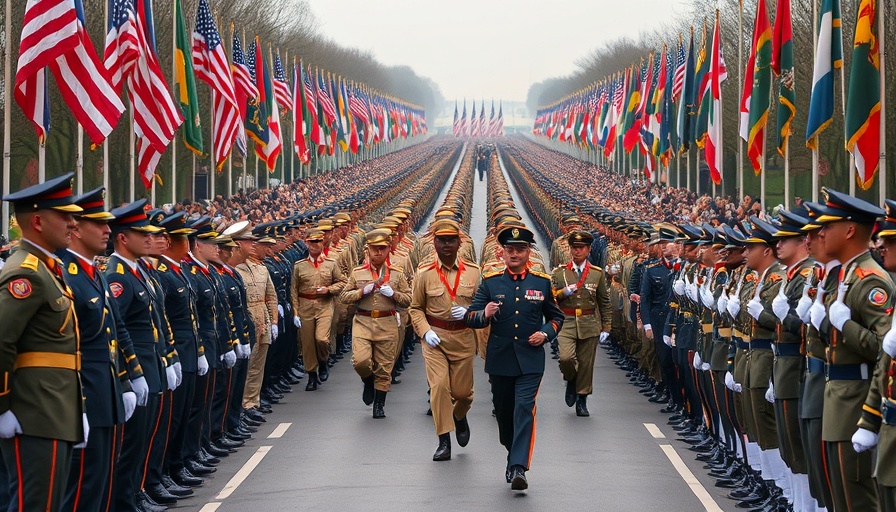
Celebrating 250 Years of Military Legacy
On a cloudless Saturday, Washington, D.C., became the stage for an extraordinary spectacle commemorating the 250th anniversary of the United States military. This grand military parade, envisioned for years by former President Donald Trump, showcased not just military strength but also the enduring spirit of a nation that prides itself on its defense capabilities. The parade, a blend of tradition and spectacle, highlighted the country’s rich military heritage and aimed to instill a sense of pride amid growing political discord.
In 'Military parade celebrates 250 years of US military,' the discussion dives into the complexities of national pride and dissent surrounding military celebrations, prompting further analysis on their implications.
Trump’s Vision for the Parade
The events of the day are rooted in Trump's fascination with military parades, initially sparked during his visit to Paris in 2017. Since then, he has sought to organize a similar event that would underline America’s military prowess. This year, the parade coincidentally aligned with his 79th birthday, allowing him to witness his vision come alive, although the implications of such displays are often met with scrutiny.
A Divided Nation
While the parade attracted thousands of spectators, it also reignited an ongoing discourse about governance and public sentiment towards the administration. Nationwide protests erupted under the banner of “No Kings,” reflecting a palpable dissatisfaction among pockets of the population. Protesters condemned Trump’s leadership style, dubbing him a dictator while denouncing the administration’s policies perceived as undermining immigrants and diversity.
Public Sentiment and Political Underpinnings
The juxtaposition of the parade against the backdrop of protests brings to light the current political climate in America. While many celebrate the military display as a sign of national unity and strength, a significant fraction of the populace feels alienated, bringing into focus the complex interplay of patriotism and dissent. A critical analysis reveals that such extravagant displays of power may further polarize the electorate rather than unify them.
Celebrating Diversity Within Military Ranks
Yet, in the spirit of the military, which has increasingly become a tapestry of diverse backgrounds, this celebration also prompts a re-evaluation of the values that shape the American military ethos. Many of the controversies surrounding the parade focus on how the military's diversity stands in stark contrast to the administration's often exclusionary rhetoric. A thought-provoking perspective worth considering is that the military should act as a unifying force, especially in times of political strife.
Fireworks and Future Considerations
The event culminated in a dazzling fireworks display, signaling more than just a celebration; it was a symbolic reflection of a nation grappling with its identity in the face of stark political divides. The challenge lies ahead for national leaders to bridge the gap between celebrations of military history and constructive discourse about the nation's future direction.
Navigating National Observances
As world leaders observe the goings-on in the United States, the implications stretch beyond America’s borders, prompting reflections in countries across Africa and the broader global arena. The approach to national parades in Africa—often a display of military strength—invites comparisons and conversations about the underlying themes of governance and civic engagement. Countries grappling with their political narratives can learn vital lessons from this spectacle about the importance of inclusivity and the intrinsic value of representation.
Opportunities for Civic Engagement
For professionals and engaged citizens alike, this moment represents an opportunity to actively participate in shaping the narrative surrounding military and civic pride. It poses questions about how to normalize constructive dissent and dialogue in the public square while allowing traditions to thrive. We are called to reflect critically upon our national celebrations, ensuring that they resonate with the diverse voices that make up our society.
Conclusion: A Call to Civic Duty
The 250th anniversary military parade served as a powerful reminder of the duality of patriotism and dissent. It is an invitation for professionals and citizens to engage actively in conversations about government accountability and the values we uphold as a nation. Understanding these dynamics is crucial in fostering a healthy civic environment. As we navigate the future, let us consider our roles—not just as spectators but as active participants in a democracy that values every voice. The onus is on us to shape our historical narrative, ensuring it reflects the aspirations of all.
 Add Row
Add Row  Add
Add 




Write A Comment